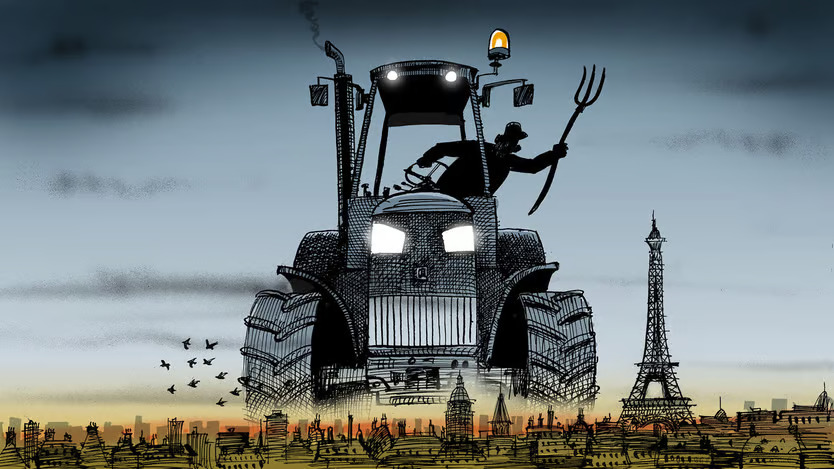Agricultural Uprising Sweeps Across Europe: Farmers Demand Recognition and Relief
In the spring of 845 AD, Paris faced a Viking siege that required 120 ships and a tribute of 7,000 pounds of silver for resolution. In 1870, Prussians imposed a blockade, leading to the city’s surrender after residents resorted to consuming rats, cats, horses, and zoo animals. Fast forward to 2024, and the siege of Paris takes a modern turn, with farmers utilizing branded tractors, such as John Deere, New Holland, or Claas, to block eight major motorways into the city.
This agricultural revolt extends beyond France, sparking protests from farmers across Europe, including Belgium, Germany, the Netherlands, Poland, Romania, and Spain. Traditionally enjoying significant privileges, with approximately one-third of the EU budget allocated to subsidies for the Common Agricultural Policy, farmers now feel these benefits slipping away. The unrest reflects a broader narrative of a privileged class witnessing a decline in status, emblematic of Europe’s struggle to navigate tradition amid the pressures of a changing world.
Farmers argue that life has become intolerable, presenting their case to authorities in Brussels. Burdened by bureaucratic hurdles associated with subsidies, they highlight the impact of stringent green regulations on their livelihoods, affecting aspects such as land use, chicken coop sizes, and hedgerow maintenance. In a world dominated by platforms like TikTok and ChatGPT, the profession struggles to attract younger generations, as no amount of subsidies can entice a 20-something into a career involving early mornings, six-day workweeks, and literal manure shoveling.
Trade deals allowing food imports with fewer environmental constraints, coupled with elevated energy and fertilizer costs from the Ukraine war, further compound their challenges. Urbanite politicians, disconnected from rural realities, are criticized for either overlooking or condescendingly addressing farmers’ concerns.
The public resonance of the farmers’ cause has prompted swift concessions. Planned fuel tax increases for farmers have been postponed in France and delayed in Germany. A long-pending EU trade deal with South America has been reevaluated, and concessions related to Ukraine are being reconsidered. Despite EU leaders discussing €50 billion ($54 billion) in aid for Ukraine, concerns about leaving fields fallow have been temporarily eased.
Agrarian populism’s electoral impact is a source of concern for politicians, as demonstrated by the success of a farmers’ party in the Netherlands’ regional elections last March. Right-wing and centrist politicians alike recognize the need to address the demands of the Green Deal cautiously, reflecting the delicate balance between modernization and preserving tradition.
The decline of European farming mirrors the broader waning relevance of the continent. With the EU’s diminishing share of global GDP and farming’s decreasing role in the EU economy, the sector faces challenges adapting to modernity. Dominated by small family-run operations, almost two-thirds of farms are smaller than five hectares, and the profession is aging, with one-third of farm managers over 65.
As Europe grapples with these shifts, the farmers on their tractors symbolize a deeper struggle — an attempt to reconcile the continent’s past with an ever-evolving present. In a world dominated by TikTok and ChatGPT, the agricultural sector finds itself grappling to bridge the generational gap and modernize its image.

